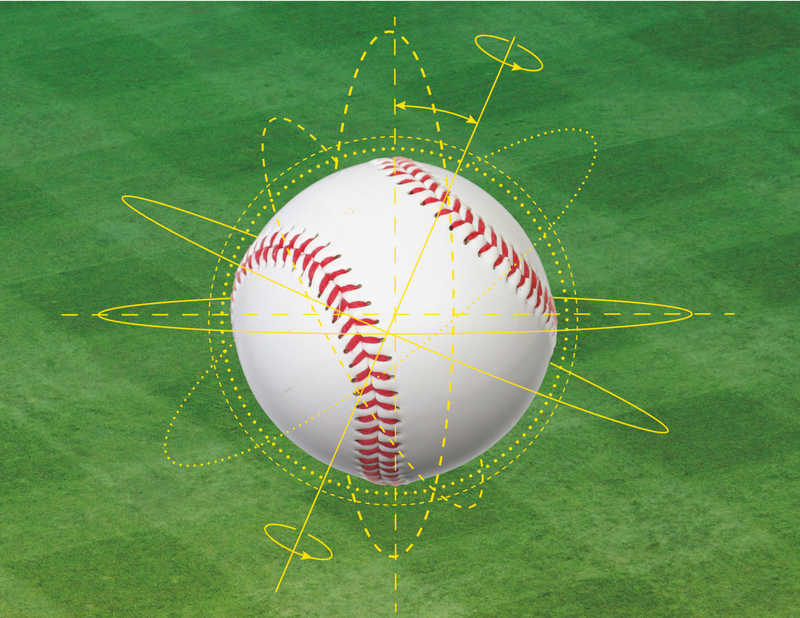
The following is excerpted from The Only Rule Is It Has To Work, the wonderful new book in which two sabermetrically-inclined baseball writers—Sam Miller of Baseball Prospectus and Ben Lindbergh of ESPN—recount their experience running baseball operations for the Sonoma Stompers, an actual, real-life ballclub. As it begins, the authors—who will be joining us for a live chat Friday afternoon—are preparing for the annual Pacific Association of Professional Baseball Clubs draft.
http://www.amazon.com/Only-Rule-Has-…
In the middle of March, Ben and I drive in early-morning silence, imagining a thousand ways to fail. Through an empty city and over a fog-thick bridge and down into Sonoma Valley, where Ben for the first time sees the vineyard-covered hills that barricade wine country from the rest of the Bay Area. It’s our first “official” day on the job.
The Stompers and the league’s other three teams are holding their annual tryout and draft. It’s in Sonoma at the junior varsity practice diamond, across the street from Arnold Field. Nobody expects to find the next Pacific Association All-Star here—more honestly, the front offices need to generate revenue somehow during the off-season, and they charge $100 per participant in an American Idol–style open call—but for the guys whose emails went unanswered, it’s a last, best chance to be more impressive in person than in a choppy highlight reel. A hundred or so ballplayers fly, drive, or bicycle to the one-day event knowing that, at worst, they’ll have a story they can impress future girlfriends with (“Yeah, thought about playing pro ball when I was younger. Even tried out for a club once …”) and, at best, they’ll earn an invitation to spring training. Just an invitation. The distinction between the best and the worst, we’re led to expect, is between pretenders who have no chance and pretenders who might at least earn the right to hang around for a couple more months. Ben and I dread finding out which category we belong in.
Ballplayers line up for registration, shoulders back, socks high, wearing batting practice T-shirts from their most impressive-sounding former team—in most cases, college. (A Division I school gets your name circled in our notebooks.) Last year, Theo tells us, the turnout looked like “a bunch of dads,” but this year it’s 85 percent boys, 15 percent men, including the fifty-five-year-old knuckleballer who compared himself to Jackie Robinson. They stretch with purpose and try to make themselves handsome, posing for imagined scouts, not knowing which of the nonathletic thirtysomething dudes circling in sneakers actually has decision-making power. Ben and I, inadvertently matchy-match in rust corduroy pants and black hoodies, grab clipboards and wait for the glow of authority to halo us. Our team’s new owner, Eric Gullotta, who bought the team two months earlier and inherited two statheads, delivers our Stompers hats. We’re with the team.
It’s not just Ben’s first day on the job, but also his first day in Sonoma. He quickly gets a feel for its blend of small-town innocence, hippie-burnout liberalism, and excess-money eccentrics. It’s a place where people keep going to their pediatricians well after they turn eighteen. Where everybody can point out “the sex spot” up on the hill overlooking Arnold Field (and a nearby cemetery). After Ben walks into town to look at a cottage for rent near the ballpark, he comes back like he’s under a spell. “I saw a pet pony,” he says slowly. “On a leash.”
Sure, everybody but us knows the pony guy. They tell us he comes from old Sonoma money—streets are named after his family. The local legend says that the little horse makes him feel safe, and that the city approved a service-animal permit so it could stay by his side. The long knife he straps to his cutoff denim shorts provides further protection.
Ben likes it here.
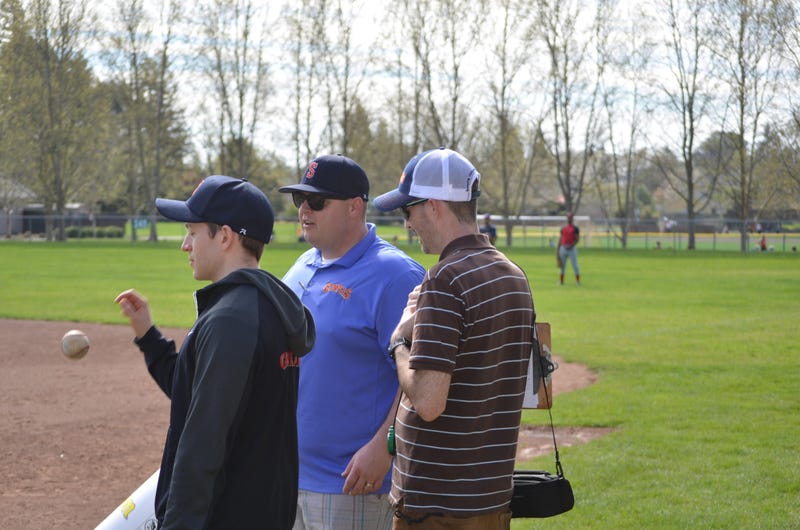
We move the aspiring ballplayers into right field for the 60-yard dash. There’s an extremely good reason we have them run the 60: They expect us to. When they watch the NFL combine, there’s always a measured sprint. If they’re going to pay $100 to tell their future girlfriends about their pro baseball tryout, there’d better be a combine-style measured sprint to make it real. So even though the grass is drenched with March morning dew, making the runs slow and sloppy, we make them run.
The rest of the coaches all but ignore this formality, which is no more interesting to them than the registration and the stretching. Two teams don’t even send a staff member out to the finish line to record times. But Ben and I are as focused as a liquor store owner tracking a group of teenagers in his shop. It’s our first day, and we are in full tryhard mode. We’re recording everything—the way they register and the way they stretch, their handshakes and their undershirts. We’re still unsure which data will unlock these players’ biographies for us, so we collect it all. We also recall Branch Rickey’s philosophy of scouting: The most important tool, in any era or environment, is speed, “the only common denominator of offense and defense, and the best single indicator of major league potential.” We load and cock our pro-style stopwatches, and as fast as these kids can skid past us in pairs we record their times.
There are no 6.5s.
There is an 8.8 and there is a 7.3 and there is an 8.1 and there’s even a 6.9 and there are a lot in the middle. We lie to kids who ask us for their times, offering them an idealized version of their best self while noting on paper the reality: not fast, not graceful, not controlled, not for us. (Maybe they all think they’re 6.5s because no one ever tells them the truth.) Like the big guy standing at the starting point, tryout participant no. 173. He looks like David Ortiz with a few extra pounds, which is not a flattering body type on a kid at this level. “Uh-oh,” I say, as the kid readies for a signal. “This could be ugly. This could be a nine.” Fehlandt yells “Go!” and the tractor ride begins. . . .
Except the big dude can move. He keeps pace with his race partner, then begins pulling away, picking up speed as he settles into a smooth, symmetrical running stroke. His 250 pounds whoosh past us, and his time is well faster than the median. Ben looks over and smiles. So far as we can tell, no other team at the tryout has just seen this kid run. We have, for the first time this year, in the smallest and subtlest way, built an information advantage.
The boys scatter to their positions, and we migrate to scouting spots thirty feet behind them, where we can see their movements, gauge their arm strength, and hear every thing they give away in their small talk. (“Fucking thing took a shit hop on me,” one says, and we scratch out his name. There are going to be a lot of bad hops this year, and it’s way too early for complaining.) We ignore everybody in left field. There will be no good baseball players who self-identify as left fielders—anybody good will have the range for center, the arm for right, or the self-confidence to pretend one or the other. Ben and I move to center field, marking down our assessments as a crude filter to help us focus our attention. Like typical scouts, we pull the power move of leaving our station and moving onto the next one before each position is finished. Perform for nobody, chum. We’ve seen enough of you. We’ve measured you up; nothing you can do now will impress a couple of pros like us. One hour with stopwatches and we’re already a couple of assholes.
As during the sprints, we find ourselves the most attentive “scouts” on the field. This is understandable—there’s very little chance that a player is going to win a job by the way he flags down a can of corn and hits a cutoff man in a nongame situation—but it once more gives us an edge, as we obsess over the tiniest details. As the shortstops and centerfielders flag down fungoes to prove their premium-defender capabilities, we note our surprisingly fast David Ortiz clone fielding throws at first base. His footwork is graceful, his scoops effortless, his arm stroke short, and his throws strong and accurate. And so we have a kid who is 6-foot-5, 250 pounds, looks like David Ortiz, and can field and run.
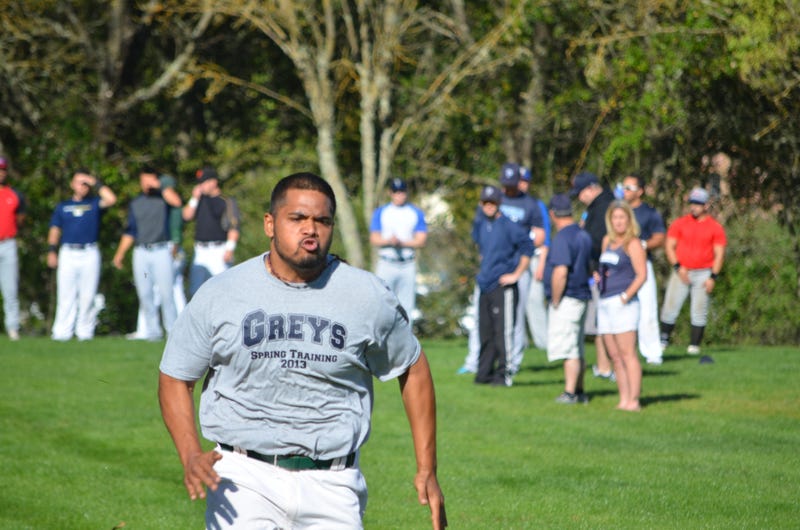
Is there any chance this kid can’t hit? Is there any player in history who checks off all the “looks like David Ortiz but can field and run” boxes and can’t hit? Of course he can hit. He’s clearly, unambiguously, the best player on this field.
And we’re not going to get him. Earlier in the day, we learned the depressing news that we’re probably not going to get any of the players we really want. Pittsburg’s owner has accused Theo of tampering. One of the Pittsburg outfielders, furious at how he had been treated during the 2014 season, and ignored all off-season by his club, continually reached out to Theo, asking for a job. Theo ignored him for months but, by January, with Pittsburg apparently uninterested in re-signing the player, and with said player working out regularly with guys from our 2014 team, Theo agreed to sign him to a league-minimum contract. Pittsburg then complained that we had stolen its player—even though
it’s only a gentleman’s agreement that prevents teams from signing one another’s players, who are legally independent contractors and have the right to play anywhere they want—and, with the ever-looming threat that the Diamonds (the new name of the Pittsburg team) will simply quit the league if they don’t get their way, and with the existential crisis that a three-team league would face, Theo concedes. As restitution, he agrees to pay Pittsburg $500 and give them our first-round pick at the conclusion of this tryout. We did get back one extra pick by trading six doughnuts (three maple, two chocolate, one glazed) for San Rafael’s third-round pick. But without a first-rounder, every team will pick twice before we pick once. If that big dude at first base can hit like we think he can hit, he’ll certainly be snatched away before our turn comes. As he stands near the batting cage with a bat and a helmet in hand, I do something desperate.
I pull him aside. I ask him two questions.
1. Why are you here? If you’re good, you’d be somewhere else, right?
Answer: Seven months earlier, he weighed 325 pounds. He was, by baseball standards, about six standard deviations overweight, at an age when heaviness typically goes from barely tolerable to problematic. (It’s hard enough for ballplayers to maintain their mobility as they age out of their late teens or early twenties; harder still when 325 turns into 350.) For that reason, he’d gone unrecruited out of high school and attended a junior college, where he hit nineteen home runs in a two-month season. For that reason, nobody had taken him seriously as a prospect, and for that reason Vallejo, his hometown team, had rejected him at two previous tryouts. For that reason, when he’d approached Theo in the Vallejo parking lot a year earlier, Theo had excused himself from the solicitation. For that reason, he’d had to play in the Pecos League in New Mexico. And for that reason, he’d blown out his ACL just eight games into his Pecos League career, ending his lone shot in professional baseball. He was hitting .370 at the time.
And so we have a reason he’s here, which was important; without knowing the “why,” we’d only be waiting to discover his weakness, which would undoubtedly show up at some point. Which leads to question no. 2.
2. Can you hit?
The kid looks at me and cocks his head, curious at this unusual audition. “I’d like to think I can,” he says, and I notice he’s missing a front tooth. I stick out my hand.
“Sam Miller, Sonoma Stompers. Go home.”
He grips. “Daniel Baptista. What?”
“Go home. We’re signing you. Now let’s get you out of here.”
I’m not sure how this is going to work. I didn’t learn the rules of this draft all that well before we arrived, but I know that I’m breaking at least one of them. We have an information advantage, and in about ten minutes Daniel is going to hit and we’re going to lose that advantage when everybody else sees him. And cheating—was this cheating?—has never been all that far removed from sabermetrics. Read any profile of Branch Rickey, perhaps the first sabermetrician (though the word didn’t yet exist) in professional baseball, the Dodgers GM who signed Jackie Robinson and hired a stathead assistant and built up the first farm systems and more or less dominated Major League Baseball for decades, and there’s an undercurrent through it all: This dude cheats! Rickey devised the “desk contract,” whereby he would sign a young player to a contract but file that contract not with the league but to a desk drawer. The kid would be sent off to play for a farm team, essentially (and unknowingly) still auditioning for a job, and if he didn’t pan out Rickey would simply release him—and disappear the contract. Rickey’s sins, baseball’s commissioner once said, were “as big as the universe.”
It’s not that cheating is socially acceptable in baseball; the shock and indignation over the steroids era are proof that it is very much not. It’s that certain kinds of cheating are socially acceptable in baseball, and being competitive means engaging in the ambiguous negotiation of the acceptable vs. the unacceptable. In a twenty-second window, I have to decide which this is. I have to decide whether I am hurting Daniel’s negotiating power, and thus exploiting a kid with little leverage. (As only one team would have his rights regardless, and he would have no negotiating power anyway, I decide I am not.) I have to decide whether I am engaging in something like insider trading, where I am taking advantage of information that another team does not have access to. (No. They could have watched the 60-yard dashes as easily as we did. It’s not like I am taking Daniel off-site to watch him hit before I sign him—though I briefly consider it.) I have to decide whether there is any other, noncheating way of accomplishing the same goal. (No. Because the Diamonds have screwed us over with their absurd demands. Heck, as I weigh the morality, I conclude that they are the ones trying to exploit labor, and we are the ones standing up for player mobility and agency. We’re the good guys!) In those twenty seconds, I decide that we are definitely going to be in trouble if we get caught and that I definitely am not going to feel guilty if we don’t. And we shake. Now if I can just get him off this field without being seen doing it.
Baptista shakes my hand. “Thank you! Thank you!” he says.
“Can you get home?”
“Right now? Actually . . . no. My ride is still trying out.”
“I’ll give you a ride. You go that way,” I say, motioning toward the left-field line, “and I’ll meet you in the parking lot in fifteen minutes.” He shakes my hand again. He packs his bag, slings it around his shoulder, walks past the chain-link dugout, and begins to walk the 330 feet until he’ll be beyond the left-field wall and out of our rivals’ sight. He does not make it. We see a man in his early thirties call out to him, and Baptista stops.
“Bleh,” I say. “Who is that?”
“That’s Matt Kavanaugh,” Theo says. The Pacifics’ manager, who caught for San Rafael the previous two years. We try not to stare; we know that in a few seconds he’s going to look over at us, and we can’t be seen paying too much attention. And there it is: He looks over at us, me and Theo and Ben, looking at each other intently and pretending to be talking about something we just saw on the other side of the field.
“Is he looking at us?”
“I think so.”
“Is he still looking at us?”
“Yeah.”
“Is he still looking at us?”
They talk for a minute, then five. There’s no physical contact between them; Kavanaugh looks as if he’s trying to talk Baptista into getting his air filter replaced. I move slowly down the right-field line, exaggeratedly jotting down notes about what I’m seeing in the right fielders standing nearby. I reach the outfield wall and survey the area, having transitioned into my needing-to-pee, where’s-the-bathroom character. Baptista and Kavanaugh are ninety degrees to my left, and I strain to see separation between them. I dip down a grassy area toward the bathroom, then tuck behind it and find the parking lot. I can no longer see Baptista, and so I stare at my phone, waiting for an update from Ben. And then, suddenly, around a pickup truck, comes Daniel Baptista, his bag still slung, his eyes still wide and hopeful. “Ready to go?” he asks. I am ready to go.
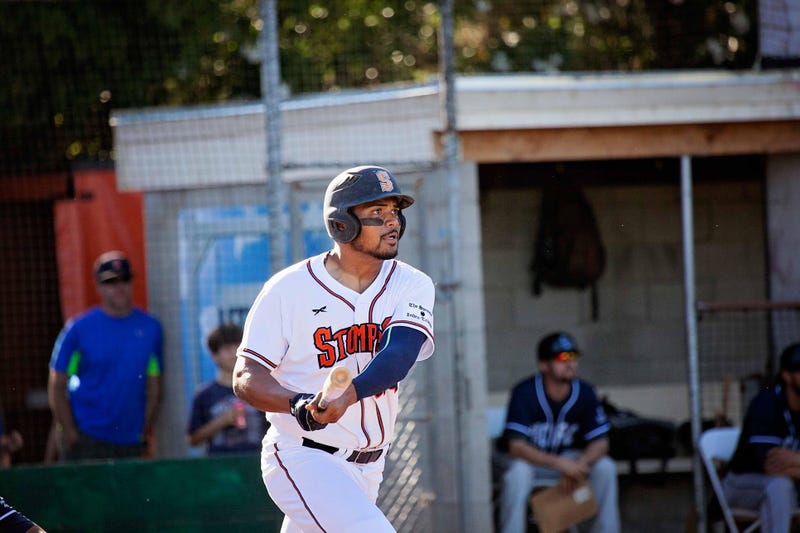
It’s a nervous exchange as we drive away, a first-date conversation where your date’s ex is sitting at the bar across the restaurant. We’re waiting for the reckoning to chime on my phone, and we talk to avoid the tension.
“How’d you lose all the weight?” I ask.
“It was a poor man’s college diet. I literally drove to Walmart every morning, bought discounted rotisserie chicken for $4.86, and a bag of iceberg lettuce, and one loaf of French bread. I had to make the bread last the whole week, and after three it would be no carbs. And then work out every day. It was a whole chicken, so it wasn’t like I was starving—I was eating well, but it was just good protein, good lean. And seven bucks.”
“I don’t even want to know how they can sell a chicken that cheap,” I say. “You buy a whole chicken raw, it’s going to cost you eight, nine bucks. How do they take that, cook it, make it that delicious, put all those spices on it, it’s tender, it’s slow-cooked, and now it costs half as much?”
“Man, something else gotta be going on behind closed doors to those chickens,” he says.
My phone rings. “Okay,” I tell him. “Here we go.”
“Theo. We’re in the car. You’re on speakerphone.”
“Oh? You and . . . ?”
“Me and Daniel. I’m driving him home.”
“Oh. When … why did you guys leave?”
“Why’d we leave?” I look at Daniel, confused.
“Yeah,” Theo says.
“Uhhhhhh. His … grandma was sick?”
“Oh, shit,” Theo says, relieved that I’m playing along. “I’m sorry to hear that. Did Kavanaugh ask him why he left?”
“He did ask,” Daniel says, “and I told him I was told to go home.”
“By who?”
“I said … by Sonoma.”
“By Sonoma? That’s weird. By who with Sonoma?”
I’m now also feigning confusion, unsure whether I’m on speakerphone, too. “Could it have been . . . could Jayce have done it?” “Jayce” is Jayce Ray, the Stompers’ star player last year, who has moved up to a higher league but is hanging around the tryout for fun.
“I’m not sure,” Theo says. “We’ll try to figure it out. I’ll see you when you get back here. Tell Daniel we’re sorry he had to leave.”
The call ends. “Okay,” Daniel says. “That scared me a little. What went on right there?”
“I have no idea.”
“Hope the contract’s still good.”
“It’ll be good. Either everybody will be cool, or they’ll fine us and it’ll be worth it.”
“I like that,” Daniel says. “I’ll make it worth it.”
I drop him off and speed back. Ben’s calling. Ben’s terrified. Everybody is really serious over here, he tells me. He thinks we’re in trouble. He and Theo have decided that the best thing to do is blame me, and blame my ignorance: I didn’t know that there was a draft, we’ll say; I thought we could just sign guys. He told me he wanted to go home, and, like an idiot, I told him he should, because we would definitely like to sign him. Derp.
I go back, act stupid, say what a dummy I am, say I thought I was just doing a kid a favor, and apologize for my mistake. The compromise is that Daniel will still be available to every team in the draft at the end of this. We still don’t pick until every team has picked twice, but at least we’ve kept anybody else from seeing what we saw. The fear is that, by showing how eager we were to sign him, we’ve now created an even more attractive player than he otherwise would have been. “They’re going to draft him out of spite, aren’t they?” I ask Theo as we gather around before our picks. Theo thinks. “Kavanaugh? Yeah, he’d do that.”
The rest of the tryout and draft is almost an afterthought now. Fehlandt wants to sign pitchers, particularly a guy named Caleb Natov, who throws in the mid-80s with an easy but unathletic pitching motion. I don’t want to fight too hard; it’ll be tough enough getting Baptista from the other teams, and I don’t want to lose Fehlandt’s support by turning our draft into a conflict among ourselves.
“We can draft Natov,” I agree, “but we have to draft 173 first if we have him. I promised him. We can’t break our promise.”
“Pretty sure he’s not going to be there anyway,” Fehlandt says. “So there’s no real point, but okay.”
The draft takes place in front of the group of players. They sit there, waiting for us to call their name, and then nine out of ten of them will walk away, shamed.
“This is cruel,” I whisper to Ben.
“Like gym class,” he says.
Pittsburg is up first; their owner/GM/manager, the former major league reliever Wayne Franklin, has already left, in keeping with the organization’s reputation as the league’s bad haircut. He has left instructions for his first two picks—his and the one he took from us—and we’re confident that, in the half hour he spent at the field today, he didn’t see (or hear) enough to take Baptista. He does not. He drafts a good-looking catcher and a slight left-handed pitcher from Hawaii.
Vallejo is next, and this concerns us. They’re known for putting a premium on local kids, for the headlines and because host families are harder to find in Vallejo. Baptista is from Vallejo, and he tried out for Vallejo when he was still fat. Their representative, a veteran coach named Mike Samuels, chooses number 146, a pitcher who was on Fehlandt’s wish list. I’m impressed; I didn’t see anything in the guy, but Fehlandt picked him out, and another team saw it, too. I’m even more impressed when I notice that the Pacifics are mad; they were also going to take him.
San Rafael has the next two picks, and here we’re sure we’ll lose our guy. The Pacifics are good enough and rich enough that they might not see any two guys on the field they think can crack their lineup; they might take Baptista just to keep him from us. Kavanaugh keeps us in suspense by giving the waiting players a speech: “I just want to say thank you to everyone. As baseball players, we’ve all been in your shoes. It’s a tough place to be.” He encourages them all to stay in touch. “With that said, we’ll take 144. We got another pick: 60.” Two pitchers.
I’m still quietly stressing to Ben and Fehlandt that we need to get Baptista, making it less about how good he is—which might spark debate—but because we promised him, and it’s harder to argue against a promise. “Yeah, yeah, we have to,” Fehlandt agrees. Vallejo makes its second pick—147—and, as quietly as we can, so nobody sees how desperate we were, we whisper to one another, “We got him.”
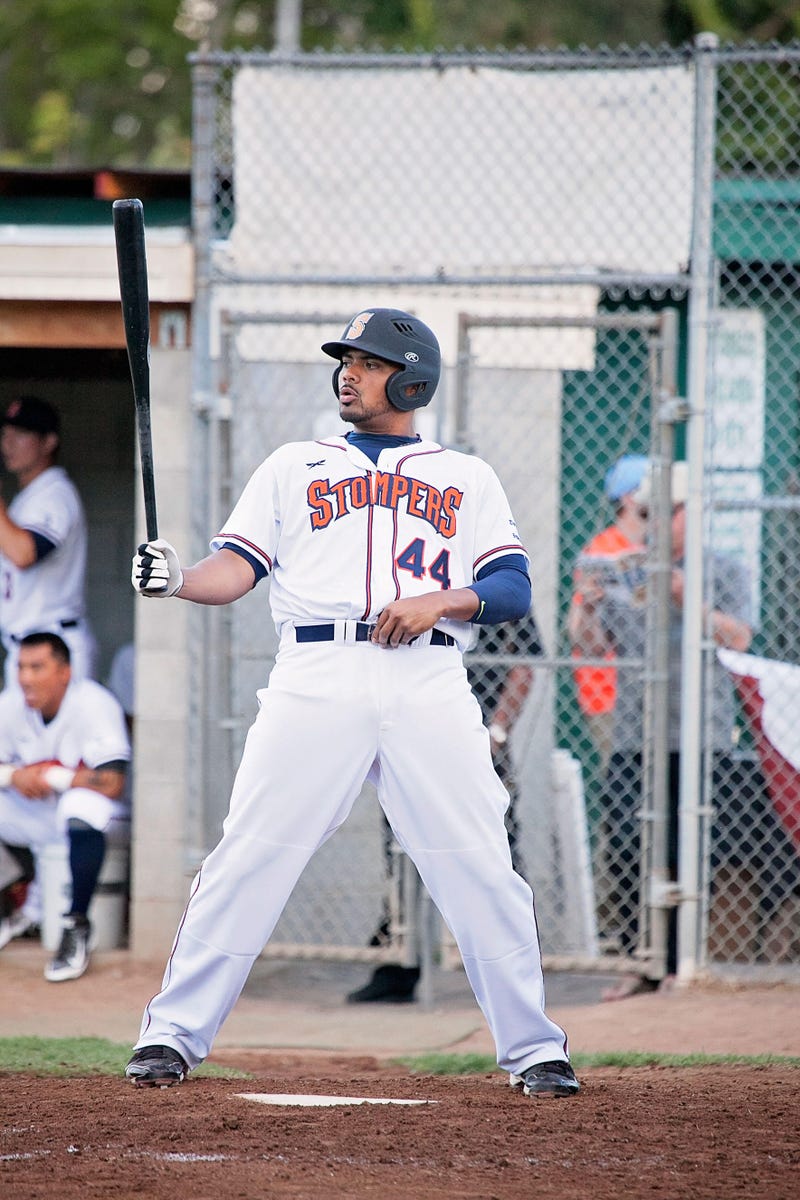
“Okay,” I say calmly, “we’ll take 173.” I try to act somewhat surprised when nobody stands up—173 apparently isn’t here, huh, how about that—and Fehlandt breaks the confusion: “He left.” The draft moves on to Pittsburg, who takes …”
“Hold on, time-out,” somebody says. A young man has come over to take his spot on our roster. “I’m 173,” he says. And suddenly I panic.
Did I call the wrong number? Hold on. Hold on. Hold on. . . . We look at our sheets, and …
“No, you’re 174.”
“No, I was 173.”
“You’re Reginald? You’re 174.”
“Oh.”
We got him. We got him. I can’t believe we got him. We also got Caleb Natov, the big right-handed pitcher that Fehlandt wanted, and Mark Hurley, a right fielder from nearby Monterey who impressed all of us with his concentration and clean fundamentals. We don’t expect much from these two, but at the very least we figure Natov can get outs and Hurley will make plays in the outfield. As Fehlandt puts it, “That’s the fun thing about this league: You don’t have the money to say there’s going to be somebody better coming along.”
As we drive home in the dark, back out of Sonoma Valley, back over the fog-thick bridge, back through an empty city, I’m thinking only about Baptista. I scream as loud as I can: “We got him!”
And Ben, quietly, says, “Now let’s see if he’s any good.”
Excerpted from THE ONLY RULE IS IT HAS TO WORK by Ben Lindbergh and Sam Miller, published by HENRY HOLT AND COMPANY, LLC. Copyright © 2016 by Ben Lindbergh and Sam Miller. All rights reserved.



